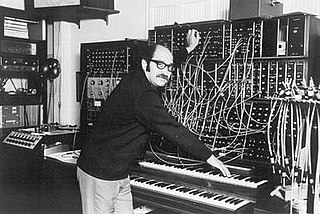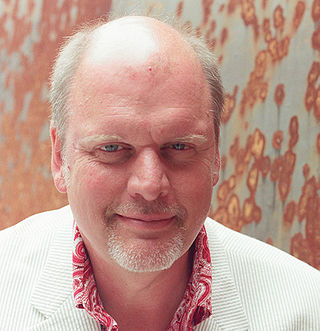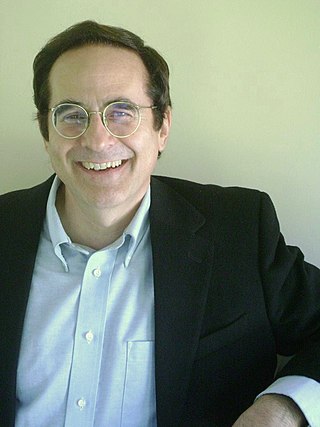
George Bernard Worrell, Jr. was an American keyboardist and record producer best known as a founding member of Parliament-Funkadelic and for his work with Talking Heads. He is a member of the Rock and Roll Hall of Fame, inducted in 1997 with fifteen other members of Parliament-Funkadelic. Worrell was described by Jon Pareles of The New York Times as "the kind of sideman who is as influential as some bandleaders."

Raymond Scott was an American composer, band leader, pianist, record producer, and inventor of electronic instruments.

Oscar Levant was an American concert pianist, composer, conductor, author, radio game show panelist, television talk show host, comedian, and actor. He was known for his performances in the films Rhapsody in Blue (1945), The Barkleys of Broadway (1949), An American in Paris (1951), and The Band Wagon (1953). He was awarded a star on the Hollywood Walk of Fame in 1960 for recordings featuring his piano performances. He was equally famous for his mordant character and witticisms, on the radio and later in movies and television, as for his music. He was portrayed by Sean Hayes in the Broadway play Good Night, Oscar written by Doug Wright.
Thomas Z. Shepard is an American record producer who is best known for his recordings of Broadway musicals, including the works of Stephen Sondheim. Shepard is also a composer, conductor, music arranger and pianist.

Morton Sanford Garson was a Canadian composer, arranger, songwriter, and pioneer of electronic music. He is best known for his albums in the 1960s and 1970s, such as Mother Earth's Plantasia (1976), He also co-wrote several hit songs, including "Our Day Will Come", a hit for Ruby & the Romantics. According to Allmusic, "Mort Garson boasts one of the most unique and outright bizarre resumés in popular music, spanning from easy listening to occult-influenced space-age electronic pop."

Paul Bley, CM was a jazz pianist known for his contributions to the free jazz movement of the 1960s as well as his innovations and influence on trio playing and his early live performance on the Moog and ARP synthesizers. His music has been described by Ben Ratliff of the New York Times as "deeply original and aesthetically aggressive". Bley's prolific output includes influential recordings from the 1950s through to his solo piano recordings of the 2000s.

Michael Kevin Daugherty is an American composer, pianist, and teacher. He is influenced by popular culture, Romanticism, and Postmodernism. Daugherty's notable works include his Superman comic book-inspired Metropolis Symphony for Orchestra (1988–93), Dead Elvis for Solo Bassoon and Chamber Ensemble (1993), Jackie O (1997), Niagara Falls for Symphonic Band (1997), UFO for Solo Percussion and Orchestra (1999) and for Symphonic Band (2000), Bells for Stokowski from Philadelphia Stories for Orchestra (2001) and for Symphonic Band (2002), Fire and Blood for Solo Violin and Orchestra (2003) inspired by Diego Rivera and Frida Kahlo, Time Machine for Three Conductors and Orchestra (2003), Ghost Ranch for Orchestra (2005), Deus ex Machina for Piano and Orchestra (2007), Labyrinth of Love for Soprano and Chamber Winds (2012), American Gothic for Orchestra (2013), and Tales of Hemingway for Cello and Orchestra (2015). Daugherty has been described by The Times (London) as "a master icon maker" with a "maverick imagination, fearless structural sense and meticulous ear."
Hot Butter were an American instrumental band fronted by the keyboard player and studio musician Stan Free. The other band members were John Abbott, Bill Jerome, Steve Jerome, and Danny Jordan and Dave Mullaney. They were best known for their 1972 version of the Moog synthesizer instrumental hit "Popcorn", originally recorded by its composer, Gershon Kingsley, in 1969. The track became an international hit, selling a million copies in France, 250,000 in the United Kingdom, and over two million globally.
Christopher Howard Jasper is an American singer, composer, and producer. Jasper is a former member of the Isley Brothers and Isley-Jasper-Isley and is responsible for writing and producing the majority of the Isley Brothers music (1973–1983) and Isley-Jasper-Isley music (1984–1987). He is also a successful solo musician and record producer, recording over 17 of his own solo albums, including 4 urban contemporary gospel albums, all written, produced and performed, both vocally and instrumentally, by Jasper. He also produces artists for his New York City-based record label, Gold City Records. Jasper's keyboard and Moog synthesizer work was a primary ingredient of the Isley Brothers' sound of the 1970s and 1980s when the Isley Brothers were a self-contained band.
Edward Woodley Kalehoff Jr. is an American television composer who specializes in compositions for television, known for his work on the Moog synthesizer. Kalehoff composed the musical themes to the game shows The Price Is Right and Double Dare, as well as for ABC World News Tonight and Monday Night Football.

Robert Nathaniel Mann was a violinist, composer, conductor, and founding member of the Juilliard String Quartet, as well as a faculty member at the Manhattan School of Music. Mann, the first violinist at Juilliard, served on the school's string quartet for over fifty years until his retirement in 1997.
Gershon Kingsley was a German-American composer, a pioneer of electronic music and the Moog synthesizer, a partner in the electronic music duo Perrey and Kingsley, founder of the First Moog Quartet, and writer of rock-inspired compositions for Jewish religious ceremonies. Kingsley is most famous for his 1969 influential electronic instrumental composition "Popcorn".

Peter Nero is an American pianist and pops conductor. He directed the Philly Pops from 1979 to 2013, and has earned two Grammy Awards.
Alfred Wallenstein was an American cellist and conductor. A successful solo and orchestral cellist in his early life, Wallenstein took up conducting in the 1930s and served as music director of the Los Angeles Philharmonic from 1943 to 1956.
David Russell Borden is an American composer and keyboard player of minimalist music.

Leonid Hambro was an American concert pianist and composer.

Valentin Radu is founder, artistic director and conductor of Vox Ama Deus, with performances at the Kimmel Center in Philadelphia and other various city, suburban, and Main Line area venues, has led numerous orchestras and vocal ensembles in Europe and the U.S., including the Hungarian National Philharmonic, Bucharest, Arad, Oradea Philharmonics, the Budapest Chamber Orchestra and the Romania National Radio Orchestra. In 1996 he conducted the Bucharest Philharmonic in Handel's Messiah, and in 1997 led the Romanian National Radio Orchestra in Handel's Acis and Galatea.
James Behr is an American pianist, composer, recording artist & educator.

Albert Glinsky is an American composer and author. His music has been performed internationally by soloists, ensembles, and dance companies. His book, Theremin: Ether Music and Espionage won the 2001 ASCAP Deems Taylor Award, and is regarded as the standard work on the life of Leon Theremin. In 2009 Glinsky was invited by the family of synthesizer pioneer, Bob Moog, to create Moog's biography. Switched On: Bob Moog and the Synthesizer Revolution, with a Foreword by Francis Ford Coppola, was released by Oxford University Press on September 23, 2022.

The Philharmonic Piano Quartet was a New York-based ensemble of four pianists active from 1948 until the mid-1950s. Despite their name, the ensemble had no connection with the New York Philharmonic Orchestra. They toured throughout the United States and made two recordings for the Columbia Masterworks label.











